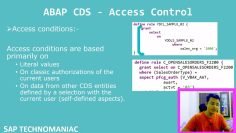This video tutorial focuses on simplifying the process of writing ABAP code by using inline declarations. The instructor demonstrates how to reduce the number of lines in your code by declaring variables and tables at the point of usage, rather than defining them separately beforehand. This method is particularly useful when writing SELECT and LOOP statements in SAP ABAP.
Key topics covered in the video session:
- Traditional ABAP Code Writing: The instructor begins by reviewing the traditional method of writing ABAP code, which involves defining a structure, an internal table, and a work area before writing the SELECT statement. This method requires a significant number of lines of code.
- Introduction to Inline Declarations: The instructor introduces the concept of inline declarations, which allows for the declaration of variables and tables at the point of usage. This method reduces the number of lines of code and simplifies the overall process.
- Writing SELECT Statement with Inline Declarations: The instructor demonstrates how to write a SELECT statement using inline declarations. The syntax requires separating the fields in the SELECT statement with a comma operator. The instructor uses the ‘@DATA’ keyword to represent the internal table, which is created at runtime based on the output of the SELECT statement.
- Writing LOOP Statement with Inline Declarations: The instructor shows how to write a LOOP statement using inline declarations. Similar to the SELECT statement, the work area is also defined at the point of usage using the ‘@DATA’ keyword. The instructor emphasizes that this method eliminates the need to define the work area separately.
- Running and Debugging the Program: The instructor runs the program to display the output and then debugs the program to show how the system automatically creates the structure for the internal table and work area based on the fields defined in the SELECT statement.






































